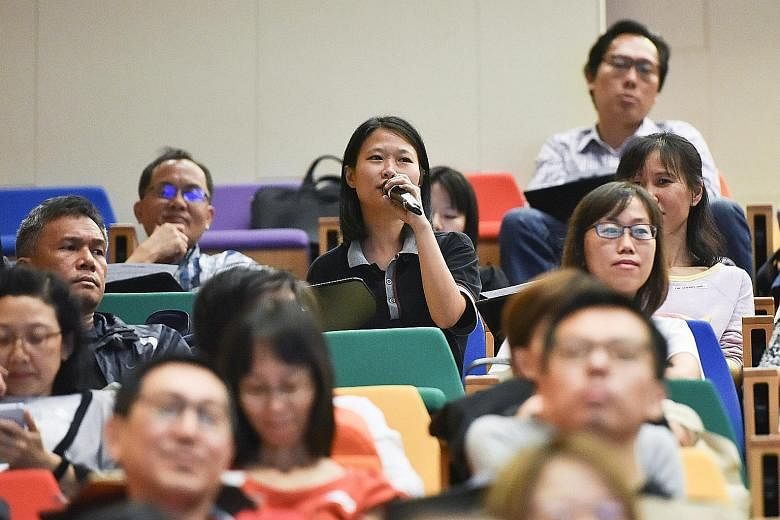Between pursuing a law degree at a local university and an apprenticeship programme for non-graduates, most young people would choose the first.
But Mr Daryl Ng did the opposite.
The 22-year-old Raffles Institution alumnus turned down an offer to read law at the Singapore Management University last year to join a one-year scheme for A-level and diploma holders at global commodities firm Trafigura. About 5,000 applicants vie for just 20 places.
The firm's chief executive for Asia-Pacific Tan Chin Hwee cited Mr Ng as an example of someone with the skills that employers are looking out for - ability to adapt, be intellectually curious and resilient.
"He's done very well and he's about to progress to the graduate programme," he said. After a year of apprenticeship, employees will move on to the graduate scheme.
Mr Tan was one of the four panellists at The Straits Times & SkillsFuture Singapore Future of Work Forum on Saturday. They took questions from an audience of about 220 and shared their thoughts on job trends, as well as values and skills that are increasingly sought-after.
Panellist Viren Shetty, who dropped out of the traditional route of education, spoke about the importance of some skills that may be acquired outside of a classroom setting. The 25-year-old quit his applied mathematics course at Nanyang Technological University to focus on his start-up, which has raised $2.3 million to date.
His software company PlusMargin uses artificial intelligence and behavioural psychology to help businesses predict how consumers behave on websites.
Despite his success, Mr Shetty said dropping out of university is risky and not for everyone. He was able to take that leap of faith because he knew he had acquired the skills and networks to stay in the tech industry, even if PlusMargin fails.
Other panel speakers also agreed that it is possible to carve out a career path based on experiences in and out of school, and not feel constrained by one's discipline of study.
Ms Feon Ang, LinkedIn's vice-president of talent and learning solutions for Asia-Pacific, told the audience how she encourages her 17-year-old daughter, a humanities student, to explore the sciences if she is keen. "You don't see (your degree) as an end, as a destination," she said. "If you today take a law degree and three years later feel that this law degree is not suitable for your passion, what's stopping you from taking another degree?
"That law degree has not gone to waste as well. Everything you've learnt is like Lego boxes that build up who you are as an individual."
Besides hard skills, the panellists said that being open to learning and having soft skills such as communication and teamwork are also important.
Ms Teo Lay Lim, senior managing director of Asean at Accenture, a professional services company, said this involves being aware of one's strengths and knowing what one needs to improve.
"Sometimes technical people say that writing well or speaking well is not important," she said.
"But if you can't pitch, no matter how good you are, you can't speak, your idea can't speak for itself."
Being able to operate in a "grey" world and make judgments when there is no right and wrong is another essential trait, said Ms Teo.
"What do you have that accentuates the human being in you, that makes you different and irreplaceable? In an age where machines are coming into the workplace, you better be a solid human being."
Adapt to thrive in new world of work
In the new world of work, one must adapt whether he or she likes it or not, said speakers at a forum on the future of jobs on Saturday.
While artificial intelligence and big data are all the rage now, they added, employers are also on the lookout for soft skills and workers who are open-minded.
Software firm PlusMargin co-founder Viren Shetty said: "You don't need to be a tech person, you don't need to have a maths or physics or computer science background, you just need to be valuable and adaptable."
The three other panellists at The Straits Times & SkillsFuture Singapore Future of Work Forum agreed.
Mr Tan Chin Hwee, Trafigura's chief executive for Asia-Pacific, said the world's problems are not about technology.
"Usually it's an operational problem, a human resource problem, it's a human recruitment problem," he said. "For many of the large corporates, yes, technology is disrupting, but it is an enabler."
Participants at the forum raised a range of questions including what sort of skills are in demand; how to demonstrate resilience to a potential employer; and how to start a company.
One essential attribute is to be "intellectually curious". This includes asking the right questions, instead of just getting the right answers, said Mr Tan, who sits on the boards of two institutions - the Nanyang Technological University and Shanghai Jiao Tong University.
From his experience, Shanghai students will read up on invited speakers and stay on after the talk to find out more.
But here, students go for such talks to have their attendance marked. And they leave the moment it ends because the sessions do not contain examinable content, he said.
It is a challenge to change the mindsets of young people so that they learn not for the sake of grades but are genuinely curious about issues, he added.
Another key trait is having resilience - whether it is in running a start-up and facing the possibility of failure, or being able to relearn skills or pick up new ones in a changing economy, said the speakers.
Having a good digital profile, being able to articulate and present well in interviews, and networking skills, are also important in securing jobs, said Ms Feon Ang, LinkedIn's vice-president of talent and learning solutions for Asia-Pacific.
About 70 per cent of job opportunities are filled by people through referrals, she said.
Amelia Teng



